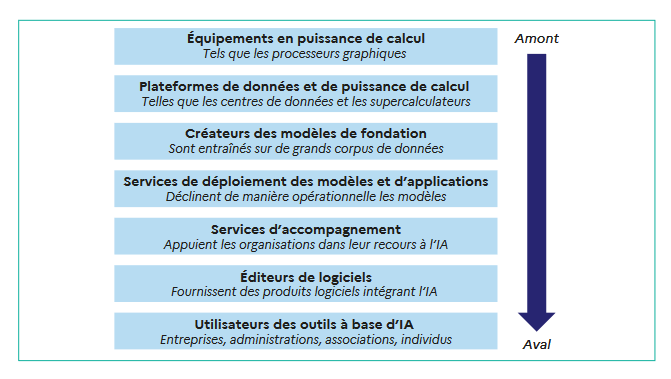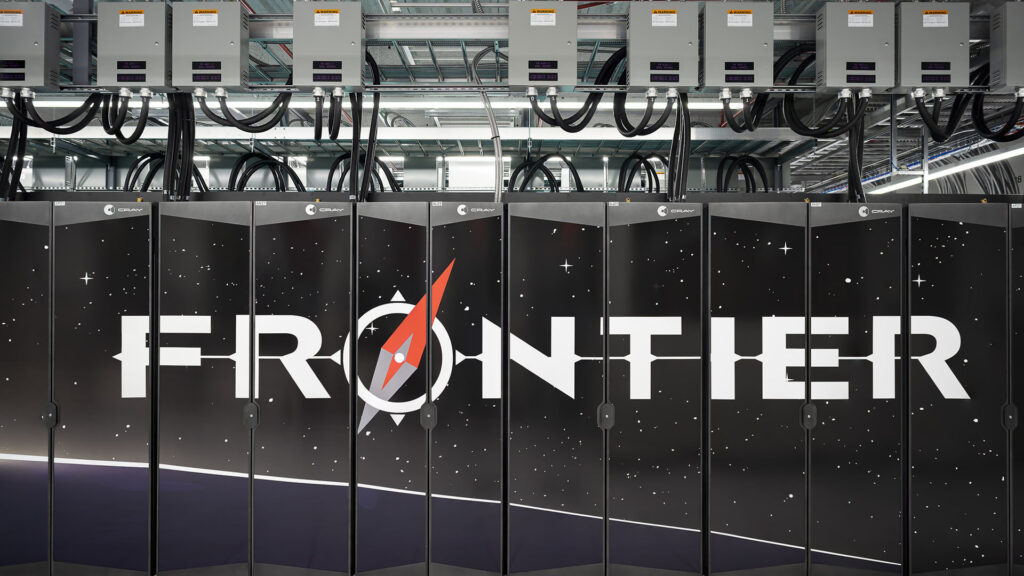The commission on artificial intelligence has submitted its work, after six months of consultation. It proposes a 25-point action plan, at the cost of an investment over 5 years of 27 billion euros. Among the avenues is the need to take a closer look at exascale class supercomputers. This is an issue of strategic autonomy.
There are twenty-five of them, but this appears to be one of the most salient proposals in the report submitted this Wednesday March 13 by the commission on artificial intelligence (AI). Recommendation number fourteen calls on France to take a more active approach in the field of supercomputers, in order to guarantee “ strategic autonomy ” from the country.
This proposal is part of a global effort proposed by the AI commission, at the cost of a massive investment of 27 billion euros over a period of five years to implement all the measures of the plan. Concerning the part on supercomputers, the amount mentioned reached one billion euros over the period. This is far from being the most expensive item.
Other avenues will require an even more voluntary commitment, if they are followed through on. This is the case of support for a sector of dedicated semiconductor components (7.7 billion euros), support for the French ecosystem (3.6 billion) or the transformation of infrastructure and public services (5.5 billion).

France had given itself six months to establish a strategy on AI. A working group was then set up by the government, with figures from the sector. We found Yann Le Cun, head of AI at Meta (Facebook), Luc Julia, creator of Siri, Joëlle Barral, director of research at Google DeepMind or Arthur Mensch, founder of the startup Mistral AI.
In their report, the members of the commission observe that “ the services associated with supercomputers and data centers constitute the essential second brick of computing power for AI. » However, when it comes to generative artificial intelligence, computing power is essential.
Generative AI is this field which brings together systems that produce content at the request of the Internet user. ChatGPT is a typical example of a text-generative AI that responds to instructions. In the field of illustrations, there is Dall-E or Midjourney. There is also Sora in the video. There are also solutions in sound.
“Europe is late and is far behind”
However, the observation made by the commission is brutal: “ Europe is behind in terms of public computing power and is far behind in terms of computing power installed by private players. » The United States is well ahead, with 143 of the top 500 supercomputers belonging to it.
A harsh observation, but not new: this imbalance has been regularly noted for more than ten years. Above all, ” this imbalance tends to worsen with regard to the computing power dedicated to AI », warns the report, citing the massive purchases made by Meta, Microsoft, Alphabet (Google) and Amazon in computing power.
The commission therefore judges “ that France and Europe must imperatively become a major center of installed computing power », following three objectives:
- provide public computing power for sensitive use cases;
- provide accessible and affordable computing power to stimulate research and development of AI start-ups;
- be able to train and use the most advanced AI models on European soil.
As such, the report puts forward possible strategies for use cases. For example, the use of a public machine allowing high performance calculations must remain free if this contributes to open science. Proposals are also made if it involves aid to startups, if it involves sensitive treatments, etc.
France must do more in exascale, now
The members of the commission therefore evoke the need “ to accelerate work to extend French and European ‘exascale’ supercomputers ”, and quickly launch “ a group purchasing operation for the ecosystem and to set an objective for the establishment of computing centers on European territory. »
Exascale is a term designating a new step in high-performance computing. At this point, supercomputers are capable of performing a billion billion operations every second. The era of exascale began in 2022 with the first model of its kind, Frontier, an American machine managed by the Department of Energy.


The commission is aware that Europe, despite everything, is organizing itself to also cross the exascale threshold. Two devices of this caliber are expected, from 2024 in Germany (Jupiter project) and in 2026 in France (Jules Verne project). Thus, France “ will have a public computing power of just over an exaflop. »
Good, but insufficient. Indeed, the United States and China have already launched work on so-called “post-exascale” supercomputers, the commission further notes. “ Given the deadlines, work must therefore be undertaken now to increase public computing power after “Jules Verne. » In short, do more, do better.


Subscribe for free to Artificielles, our newsletter on AI, designed by AIs, verified by Numerama!
